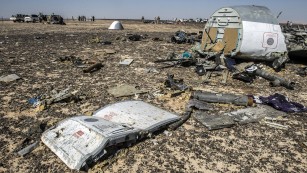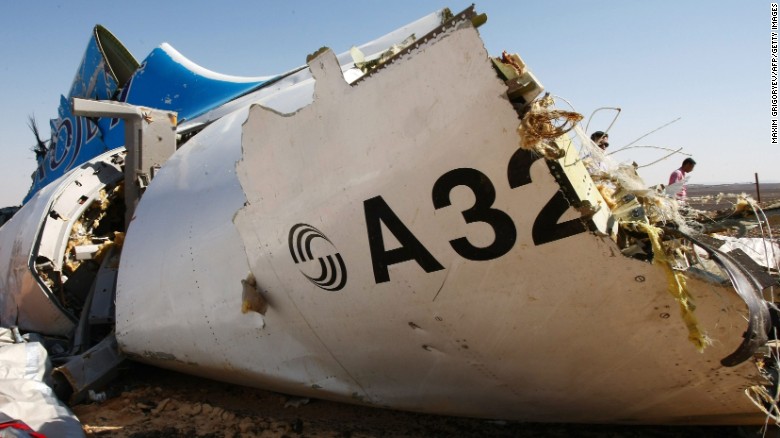Russian plane crash: U.S. intel suggests ISIS bomb brought down jet
Days after authorities dismissed claims that ISIS brought down a Russian passenger jet, a U.S. intelligence analysis now suggests that the terror group or its affiliates planted a bomb on the plane.
British Foreign Minister Philip Hammond said his government believes there is a "significant possibility" that an explosive device caused the crash. And a Middle East source briefed on intelligence matters also said it appears likely someone placed a bomb aboard the aircraft.
Metrojet Flight 9268 crashed Saturday in Egypt's Sinai Peninsula after breaking apart in midair, killing all 224 people on board. It was en route to St. Petersburg from the Red Sea resort of Sharm el-Sheikh.
The latest U.S. intelligence suggests that the crash was most likely caused by a bomb planted on the plane by ISIS or an affiliate, according to multiple U.S. officials who spoke with CNN.
The officials stressed that no formal conclusion has been reached by the U.S. intelligence community and that U.S. officials haven't seen forensic evidence from the crash investigation.
Intelligence also suggests someone at the Sharm el-Sheikh airport helped get a bomb onto the plane, one U.S. official said.
"This airport has lax security. It is known for that," the official said. "But there is intelligence suggesting an assist from someone at the airport. "
Egyptian authorities, who are leading the investigation into the crash, haven't publicly responded to reports on U.S. intelligence. Since the crash, they've downplayed the possibility that terrorism could be involved.

Egypt: 'Premature' to draw conclusion about plane crash 01:53
The signs pointing to ISIS, another U.S. official said, are partially based on monitoring of internal messages of the terrorist group. Those messages are separate from public ISIS claims of responsibility, that official said.
In an audio message from ISIS' Sinai branch that was posted on terror-related social media accounts Wednesday, the organization adamantly insisted that it brought down the flight.
"Find your black boxes and analyze them, give us the results of your investigation and the depth of your expertise and prove we didn't do it or how it was downed," the message said. "Die with your rage. We are the ones with God's blessing who brought it down. And God willing, one day we will reveal how, at the time we desire."
Typically, ISIS is quick to trumpet how and who carried out any attacks for purposes of praise and propaganda. To some, the fact that ISIS hasn't provided details in this case raises doubt about the group's repeated claims of responsibility.
Officials in Egypt and Russia have said there's no evidence to support ISIS' claims.
"That was a very baffling way to claim credit for what would be the most significant terrorist attack since 9/11," CNN terrorism analyst Paul Cruickshank said. "But there may have been a method behind this and a reason behind this, and that may have been to protect an insider at Sharm el-Sheikh airport."
Britain, Ireland suspend flights from Egyptian resort city
News of the U.S. intelligence analysis comes hours after British Prime Minister David Cameron's office said a bomb might have caused the crash.
"While the investigation is still ongoing, we cannot say categorically why the Russian jet crashed," the Prime Minister's office said. "But as more information has come to light, we have become concerned that the plane may well have been brought down by an explosive device."

U.K. uses strong language suggesting bomb was on plane
Flights due to leave Sharm el-Sheikh, Egypt, for the United Kingdom were being delayed, his office said, as a precautionary measure to allow British aviation experts to assess security arrangements at the city's airport.
Ireland has also suspended all flights to and from Sharm el-Sheikh until further notice.
Egyptian Foreign Minister Sameh Shoukry said he was "somewhat surprised" by the British decision.
"I think it is somewhat premature to make declarations related to what might or might not have happened to the aircraft before the investigation is completed and before there is a definitive cause for this crash," he told CNN.
At the airport on Wednesday, tensions quickly boiled over, one British tourist told CNN.
"People have been shouting at officials," said Sarah Cotterill, who was supposed to fly out of Sharm el-Sheikh Wednesday evening with her sister and their five children.
British embassy officials had just arrived at the airport terminal and put the passengers onto buses, she said.
"We are going to stay in a hotel in Sharm el-Sheikh. I don't know where. We don't know anything," she said. "The situation is hectic."
Militant battleground
Sharm el-Sheikh, where Flight 9268 began its journey, is a beach resort dotted with palm trees at the southern tip of the Sinai Peninsula. The plane crashed about 300 kilometers (185 miles) farther north, near a town called Housna, according to Egyptian authorities.
Sinai has been a battleground between ISIS-affiliated militants and Egyptian security forces in recent years. Hundreds have died in the fighting.
The U.S. State Department designated the ISIS Sinai affiliate, originally known as Ansar Bayt al-Maqdis, as a foreign terrorist organization in April 2014. ISIS in Sinai is one of the most active of all the ISIS affiliates and has bomb-making capabilities, according to U.S. intelligence. But if the group did plant a bomb on the plane, it would represent an increase in sophistication.
U.S. officials say ISIS has not proved to be nearly as advanced with bomb-making capabilities as al Qaeda in the Arabian Peninsula, a group that U.S. national security officials believed were working on nonmetallic bombs to be smuggled onto planes.
"If ISIS really was responsible for this, this will turbocharge their popularity in the global jihadi movement," Cruickshank said.
Russia vs. ISIS
Russia started launching airstrikes in Syria in September, saying it was coordinating with the country's government to target ISIS and other terrorists.
When news of the crash first broke, an ISIS-affiliated group known as Province of Sinai released a statement claiming responsibility for the crash, saying it had perpetrated the attack "in response to Russian airstrikes that killed hundreds of Muslims on Syrian land," according to Reuters. That claim was disputed by officials, who said ISIS couldn't have fired a missile to bring down the plane.
U.S. officials initially said they doubted Russia's claims that it was targeting ISIS in Syria. But Col. Steve Warren, a spokesman for the U.S. military's Operation Inherent Resolve targeting ISIS in Syria and Iraq, said on Wednesday that some Russian airstrikes were hitting ISIS targets in Syria.
"They've done hundreds of airstrikes at this point. I'm not putting out the count anymore, but they conduct airstrikes, but only a fraction of them have been against (ISIS) targets. And when I say fraction, I'm talking ... 10%," he said.
News Courtesy: www.cnn.com











